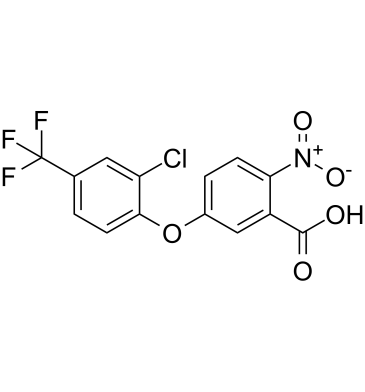Acifluorfen |
| Catalog No.GC61447 |
Acifluorfen, a protoporphyrinogen oxidase (PROTOX) inhibitor herbicide, promotes the accumulation of protoporphyrin IX (PPIX), and induces tumors in the rodent liver. Acifluorfen causes strong photooxidative destruction of pigments and lipids in sensitive plant species.
Products are for research use only. Not for human use. We do not sell to patients.

Cas No.: 50594-66-6
Sample solution is provided at 25 µL, 10mM.
Acifluorfen, a protoporphyrinogen oxidase (PROTOX) inhibitor herbicide, promotes the accumulation of protoporphyrin IX (PPIX), and induces tumors in the rodent liver. Acifluorfen causes strong photooxidative destruction of pigments and lipids in sensitive plant species[1][2].
The effect of Acifluorfen on glutathione and ascorbate levels in cucumber (Cucumis sativus L.) cotyledon discs is investigated to assess the relationship between herbicide activity and endogenous antioxidants. Acifluorfen decreases the levels of glutathione and ascorbate over 50% in discs exposed to less than 1.5 hours of white light (450 microeinsteins per square meter per second). Acifluorfen also causes the rapid depletion of ascorbate in far-red light grown plants which are photosynthetically incompetent[2].
Dietary treatment with 2500 ppm Acifluorfen for up to 13 weeks increases Cyp2b10 expression in the livers of wild-type mice, but not in CAR-knockout (CARKO) mice. Microscopically, Acifluorfen treatment-induces cytotoxic changes, including hepatocellular necrosis and inflammation, and causes regenerative changes accompanied by prolonged increases in the numbers of proliferating cell nuclear antigen-positive hepatocytes in WT mice[1].
[1]. Kuwata K, et al. Involvement of Mouse Constitutive Androstane Receptor in Acifluorfen-Induced Liver Injury and Subsequent Tumor Development. Toxicol Sci. 2016;151(2):271-285. [2]. Kenyon WH, et al. Effects of Acifluorfen on Endogenous Antioxidants and Protective Enzymes in Cucumber (Cucumis sativus L.) Cotyledons. Plant Physiol. 1985;79(3):862-866.
Average Rating: 5 (Based on Reviews and 23 reference(s) in Google Scholar.)
GLPBIO products are for RESEARCH USE ONLY. Please make sure your review or question is research based.
Required fields are marked with *




















